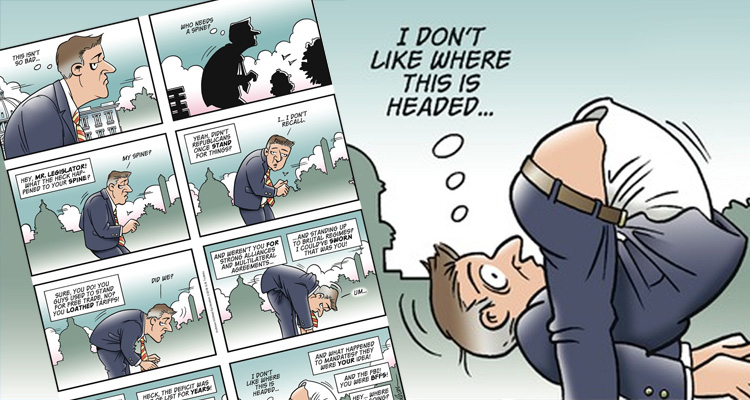One of America’s most widely read and influential magazine and web site for conservatives publishes a blistering article shredding Trump.
Founded in 1955 by noted conservative author and commentator William F. Buckley Jr., National Review promotes itself as being “America’s most-influential and largest-circulation journal of conservative opinion, and promotes their website as “America’s premier website for conservative news, analysis, and opinion.”
Described by the New Republic as “the Bible of American conservatism,” the magazine caters to a broad spectrum of conservative ideas.
Victor Davis Hanson, a regular contributor since 2001, describes the magazine’s contributors as “a wide conservative spectrum—paleo-conservatives, neo-conservatives, tea-party enthusiasts, the deeply religious and the agnostic, both libertarians and social conservatives, free-marketeers and the more protectionist.”
This Sunday, July 30th 2017, the New Republic published an article comparing David Mamet’s Glengarry Glen Ross to the real-life Trump.
The Theatre Database offers the following overview of the play: “David Mamet’s 1984 Pulitzer Prize-winning play, Glengarry Glen Ross, follows the lives of four unethical Chicago real estate agents who are prepared to go to any lengths (legal or illegal) to unload undesirable real estate on unwilling prospective buyers. The play is partly based on Mamet’s experiences working in a Chicago real estate office during the late 1960s.”
The National Review goes on to discuss a character played by Alec Baldwin in the movie version called Blake, “a specimen of that famous creature, the ‘alpha male.'” Comparing Blake to a pick-up artist, National Review turns to Trump, calling him “the political version of a pick-up artist” – a man who “inherited his fortune but describes himself as though he were a self-made man.”
Continuing, The National Review goes on to shred Trump, using the harshest of terms:
He has had a middling career in real estate and a poor one as a hotelier and casino operator but convinced people he is a titan of industry. He has never managed a large, complex corporate enterprise, but he did play an executive on a reality show. He presents himself as a confident ladies’ man but is so insecure that he invented an imaginary friend to lie to the New York press about his love life and is now married to a woman who is open and blasé about the fact that she married him for his money. He fixates on certain words (“negotiator”) and certain classes of words (mainly adjectives and adverbs, “bigly,” “major,” “world-class,” “top,” and superlatives), but he isn’t much of a negotiator, manager, or leader. He cannot negotiate a health-care deal among members of a party desperate for one, can’t manage his own factionalized and leak-ridden White House, and cannot lead a political movement that aspires to anything greater than the service of his own pathetic vanity.
He wants to be John Wayne, but what he is is “Woody Allen without the humor.” Peggy Noonan, to whom we owe that observation, has his number: He is soft, weak, whimpering, and petulant. He isn’t smart enough to do the job and isn’t man enough to own up to the fact. For all his gold-plated toilets, he is at heart that middling junior salesman watching Glengarry Glen Ross and thinking to himself: “That’s the man I want to be.” How many times do you imagine he has stood in front of a mirror trying to project like Alec Baldwin? Unfortunately for the president, it’s Baldwin who does the good imitation of Trump, not the other way around.
The National Review concludes their article, writing that: Trump “isn’t Blake, rather he’s another character in the play “poor sad old Shelley Levene, who cannot close the deal, who spends his nights whining about the unfairness of it all. So, listen up, Team Trump: ‘Put that coffee down. Coffee is for closers only.’ Got that?”




John Fugelsang Destroys Bible-Thumping Hypocrisy Of Republican Candidates – Video